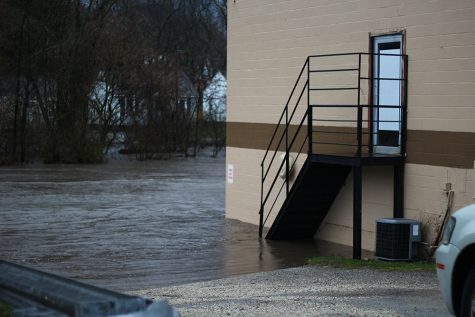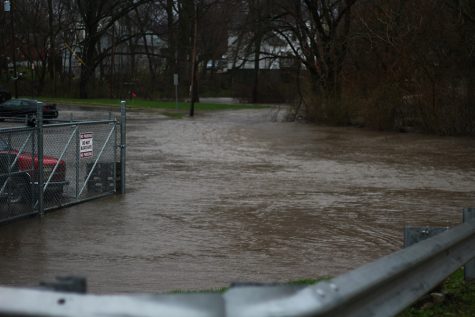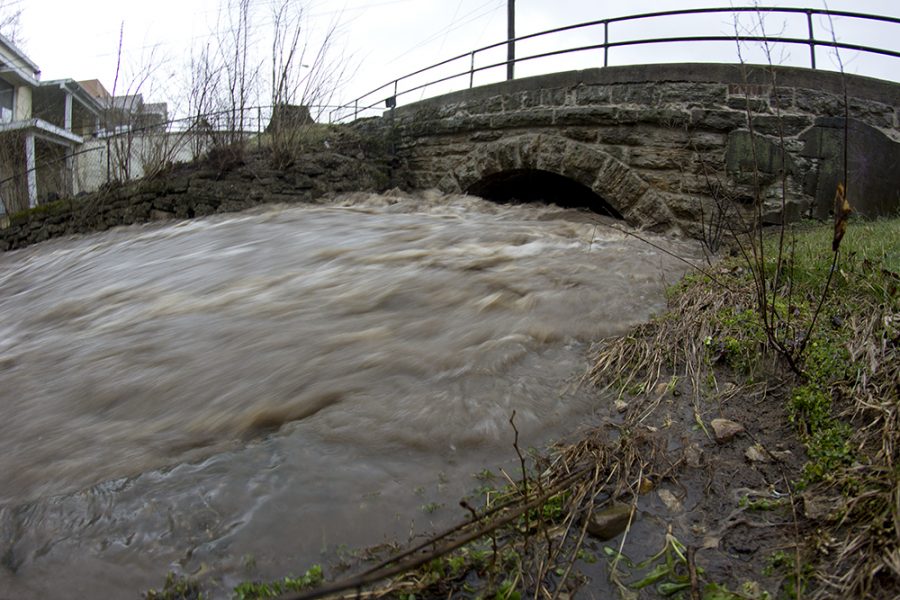Thunderstorms cause flooding around Charleston, campus
Rushing water pushes through underneath a bridge on Seventh Street Tuesday evening. Severe thunderstorms caused major flooding throughout Charleston and Mattoon on Tuesday.
April 3, 2018

The area behind Lefty’s Holler on 7th Street was left completely flooded after the thunderstorms on Tuesday.
Flooding has filled Charleston following severe thunderstorms on Tuesday.
Around 4 p.m. Tuesday, Cameron Craig, an instructor and climatologist at Eastern, said 4.3 inches of rain had fallen so far, but another inch and a quarter is expected.
This exceeded April’s average for rainfall in Charleston, which is 3.74 inches.
The west side of the Martin Luther King Jr. University Union, including the Food Court and the bowling alley, were closed as a result of the flooding. They reopened around 3 p.m. Tuesday.
“We had to shut down some electrical equipment because water was getting near it. We’ve got some leaks and water running into buildings, but that’s normal from heavy rain,” said Paul McCann, interim vice president of business affairs.
Eastern’s Physical Science building lost electricity around 11 a.m., getting it back later that day.
Coles, Edgar and Douglas counties are under a flood warning until 3:30 a.m. Wednesday, Craig said.
The rest of Charleston suffered from road closings and flood damage as well.
Curt Buescher, Charleston’s director of Public Works, said residents have significant flooding damage to private property along Towne Branch Creek and elsewhere in the city.

The area next to Lefty’s Holler was completely filled with water after the thunderstorms on Tuesday.
Buescher said the private property damage included water in basements, crawlspaces and houses, which impacted the typical contents of a home.
Six streets had been closed throughout the day: Eighth, 11th, 12th, 14th and West Polk were still closed at 5 p.m. Tuesday.
According to the Charleston Dairy Queen’s Facebook Page, the restaurant will be closed because of damage to its roof and the flooding.
It will remain closed until its roof is repaired.
Lake Land College in Mattoon reported on its Twitter page that its campus closed at noon Tuesday.
Craig said sunshine is expected on Wednesday, with more snow expected at the beginning of the weekend.
Craig said the sporadic weather changes are caused by an active jet stream, which is a fast panel of air that fluctuates north and south.
“Fast flowing air in the upper atmosphere basically tells us whether it’s going to be cold or warm,” he said.
Olivia Swenson-Hultz can be reached at 581-2818 or omswensonhultz@eiu.edu.

















![[Thumbnail Edition] Senior Foward Macy McGlone, getsw the ball and gets the point during the first half of the game aginst Western Illinois University,, Eastern Illinois University Lost to Western Illinois University Thursday March 6 20205, 78-75 EIU lost making it the end of their season](https://www.dailyeasternnews.com/wp-content/uploads/2025/03/WBB_OVC_03_O-1-e1743361637111-1200x614.jpg)






















































